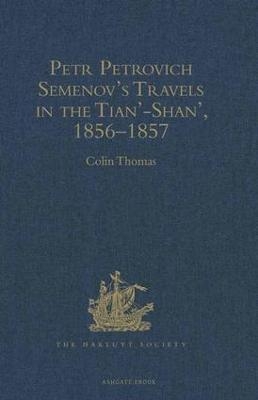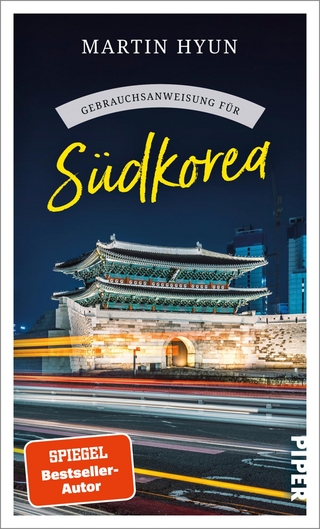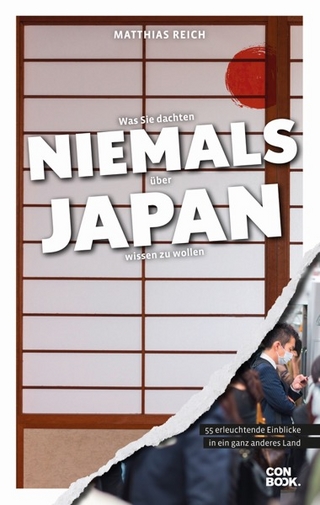
Petr Petrovich Semenov's Travels in the Tian’-Shan’, 1856–1857
Seiten
1998
Hakluyt Society (Verlag)
978-0-904180-60-2 (ISBN)
Hakluyt Society (Verlag)
978-0-904180-60-2 (ISBN)
This work presents a European view of Central Asia before the large-scale influx of Russian peasant settlers that followed the emancipation of the serfs in 1861.
In the mid-nineteenth century the eyes of western European explorers were firmly fixed on advancing inland from former maritime colonies in the Americas, Africa, the Indian sub-continent and Australasia, their motives often being inextricably bound up with concerns of imperial politics and commerce. Simultaneously, further east, Russians resumed their perceived mission to civilise Asia, following their own country’s humiliation during the Crimean War. From a springboard of Siberian territories acquired gradually over the previous three centuries, discovery and expansion radiated from the Imperial Russian Geographical Society, founded in 1845 and incorporating initiatives drawn from descendants of immigrant French and German scientists who themselves inspired a new generation of liberal intellectuals. A key personality in that movement was the Society’s librarian and secretary of its physical geography section, P. P. Semenov (1827-1914), a member of a minor gentry family who had been tutored by a pupil of Linnacus and who had studied under Ritter and von Humboldt at Berlin during a tour of Europe in 1853-4. From them he conceived the notion of travelling to the virtually unknown lands of Central Asia, ostensibly to verify opinions on the existence there of active volcanoes and glaciers. In reality his ambition was to penetrate beyond the Kazakh steppe and to reach the fabled Celestial Mountains, the Tian’-Shan’ range, which constituted the politically sensitive border between Russia and China and the equally hostile buffer zone of Muslim kahnates. Accompanied only by a serf servant, in May 1856 Semenov embarked on a 18-month journey from St Petersburg through Kazan’ to Semipalatinsk, and thence via the Altai to the newly established Russian settlement of Vernoe (later Alma-Ata, now Almaty). Subsequently he received a Cossack escort on his trek into the high plateaus and ridges surrounding Issyk-kul’, to ’the very heart of Asia’. Throughout his
In the mid-nineteenth century the eyes of western European explorers were firmly fixed on advancing inland from former maritime colonies in the Americas, Africa, the Indian sub-continent and Australasia, their motives often being inextricably bound up with concerns of imperial politics and commerce. Simultaneously, further east, Russians resumed their perceived mission to civilise Asia, following their own country’s humiliation during the Crimean War. From a springboard of Siberian territories acquired gradually over the previous three centuries, discovery and expansion radiated from the Imperial Russian Geographical Society, founded in 1845 and incorporating initiatives drawn from descendants of immigrant French and German scientists who themselves inspired a new generation of liberal intellectuals. A key personality in that movement was the Society’s librarian and secretary of its physical geography section, P. P. Semenov (1827-1914), a member of a minor gentry family who had been tutored by a pupil of Linnacus and who had studied under Ritter and von Humboldt at Berlin during a tour of Europe in 1853-4. From them he conceived the notion of travelling to the virtually unknown lands of Central Asia, ostensibly to verify opinions on the existence there of active volcanoes and glaciers. In reality his ambition was to penetrate beyond the Kazakh steppe and to reach the fabled Celestial Mountains, the Tian’-Shan’ range, which constituted the politically sensitive border between Russia and China and the equally hostile buffer zone of Muslim kahnates. Accompanied only by a serf servant, in May 1856 Semenov embarked on a 18-month journey from St Petersburg through Kazan’ to Semipalatinsk, and thence via the Altai to the newly established Russian settlement of Vernoe (later Alma-Ata, now Almaty). Subsequently he received a Cossack escort on his trek into the high plateaus and ridges surrounding Issyk-kul’, to ’the very heart of Asia’. Throughout his
Edited by Colin ThomasTranslated by Liudmila Gilmour, Colin Thomas and Marcus Wheeler
Contents: Introduction; Bibliography; Glossary; Text: From Petersburg to Semiplatinsk; First journey in the Tian'-Shan'; Second journey in the Tian'-Shan'; The heart of the Tian'-Shan'; Indexes.
| Erscheint lt. Verlag | 28.10.1998 |
|---|---|
| Reihe/Serie | Hakluyt Society, Second Series |
| Sprache | englisch |
| Maße | 174 x 246 mm |
| Gewicht | 453 g |
| Themenwelt | Literatur ► Essays / Feuilleton |
| Reisen ► Reiseberichte ► Asien | |
| ISBN-10 | 0-904180-60-3 / 0904180603 |
| ISBN-13 | 978-0-904180-60-2 / 9780904180602 |
| Zustand | Neuware |
| Haben Sie eine Frage zum Produkt? |
Mehr entdecken
aus dem Bereich
aus dem Bereich
Buch | Softcover (2024)
Conbook Medien (Verlag)
9,95 €


